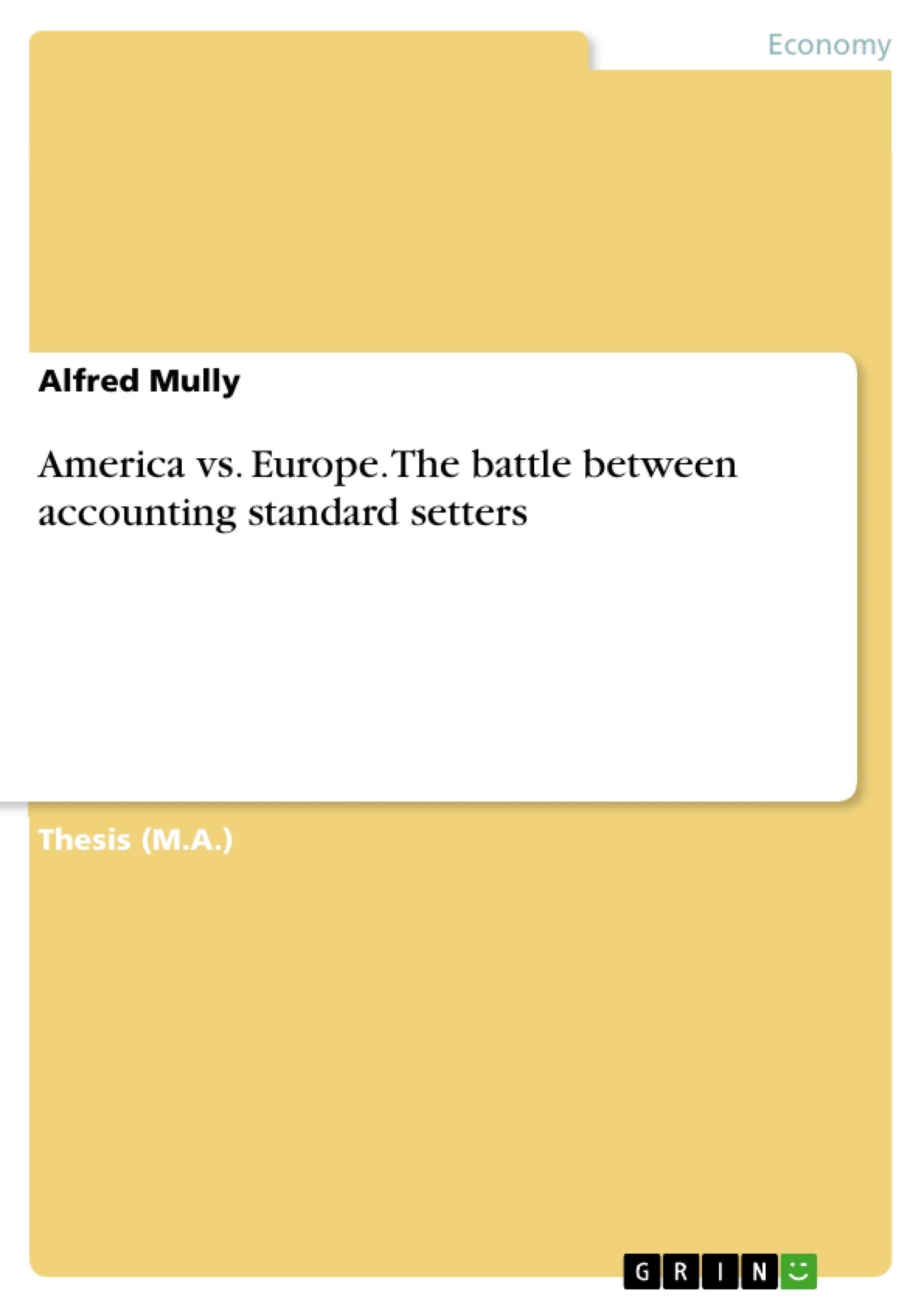Since the Enron scandal in 2001 there has been more and more media coverage on the topic of accountancy. The focus shifted from the financial statements and the companies themselves to the audit firms. The big five, and later, after the ending of Arthur Andersen, the big four, are working under significantly more pressure today.
But the audit firms are not the only scapegoats in this matter. People also started to look more and more critically to the accounting standards. Questions have risen on the relevance of the Financial Standards. Also the fact that there are more than one set of Financial Standards is remarkable. Some things that are illegal in the United States of America can be legal in the European Union and the other way around.
Therefore the IASB and the FASB are trying to come together in a process which is called convergence. In their Norwalk Agreement of September 2002, and later on renewed by the FASB-IASB Memorandum of Understanding in February 2006, it is acknowledged that both sides will need to move some way towards each other to come to a unified set of worldwide applicable financial accounting regulations. This resulted in the FASB adopting some IASB regulations, and the IASB adopting some FASB regulations, and in some cases a joint project to issue new and identical regulations on specific matters (Veron, 2007).
This process of convergence has raised criticism and questions. As put in The Global Accounting Experiment by Nicholas Veron (2007):
“The forces driving the Global Accounting Experiment are insufficient to guarantee its continued success. It is bound to face major challenges in the next few years. Two main factors are behind this: the deficit of legitimacy and accountability of the IASB, and the difficulty of ensuring consistent implementation of IFRS across sectors and countries.”
The questions raised in the convergence process, for example, are: which type of regulations on a specific subject is “better”, or more relevant? Are the adopted standards by the FASB of equal importance compared to the adopted standards by the IASB? To put this differently, is there one-way convergence from one side to another? This is namely being criticized in Europe, where critics say that this convergence process is a process of one-way convergence from IFRS towards US GAAP (Camfferman, 2010).
These three questions mentioned above bring me to the main question which I am going to answer with this research: Are the worldwide applicable
Inhaltsverzeichnis (Table of Contents)
- Chapter 1 History FASB / IASB
- The International Accounting Standards Board (IASB)
- Chapter 2 Standard Setting Process
- Chapter 3 Research Outline
- Chapter 4 Research
- Chapter 5 Results and Discussion
Zielsetzung und Themenschwerpunkte (Objectives and Key Themes)
This research aims to determine whether worldwide applicable financial accounting standards will become more American or more European. The focus is on the convergence process between US GAAP and IFRS, specifically examining one-way convergence exposure drafts issued by the FASB and IASB from 2005 to 2009.
- The convergence process between US GAAP and IFRS
- The impact of one-way convergence exposure drafts on the development of accounting standards
- The relative influence of US GAAP and IFRS on the convergence process
- The implications of the convergence process for global financial reporting
Zusammenfassung der Kapitel (Chapter Summaries)
Chapter 1 provides a historical overview of the FASB and IASB, outlining the reasoning behind the need for standard setters and their respective missions. Chapter 2 details the standard setting process, providing context for the subsequent research. Chapter 3 outlines the research methodology and approach used to investigate the convergence process. Chapter 4 presents the core research findings, analyzing the comment letters issued on one-way convergence exposure drafts. Chapter 5 summarizes the results and provides a concluding discussion, drawing insights from the research and highlighting its implications for the future of accounting standards.
Schlüsselwörter (Keywords)
The key focus of this research lies in the convergence process between US GAAP and IFRS, with a particular emphasis on one-way convergence exposure drafts, comment letters, and the relative influence of American and European perspectives on the development of global accounting standards.
Frequently Asked Questions
What is the focus of the "America vs. Europe" accounting research?
The research focuses on the convergence process between US GAAP (FASB) and IFRS (IASB) and whether global standards are becoming more American or European.
What was the Norwalk Agreement of 2002?
It was an agreement where the FASB and IASB acknowledged the need to move toward each other to create a unified set of worldwide financial regulations.
What is "one-way convergence"?
It is a criticism that the convergence process primarily moves from IFRS toward US GAAP, rather than being a mutual exchange.
What challenges does the IASB face?
The main challenges include a deficit of legitimacy and accountability, and the difficulty of ensuring consistent implementation of IFRS across different countries.
How was the research conducted?
The researcher analyzed one-way convergence exposure drafts and comment letters issued by the FASB and IASB between 2005 and 2009.
- Quote paper
- Dr Alfred Mully (Author), 2010, America vs. Europe. The battle between accounting standard setters, Munich, GRIN Verlag, https://www.grin.com/document/267065



